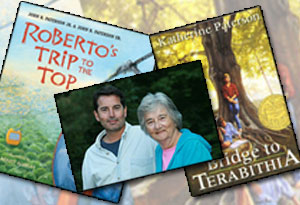The Paterson Files

In what is surely not the first conversation of its kind, John Paterson sits across the table from his idol and mother, Katherine Paterson. Since the publication of his children's book, Katherine is now more than an idol, more than a mother, she is also a peer. His book, Roberto's Trip to the Top, is co-written with his dad, John Paterson, Sr. And if the time ever comes to adapt it for film, it will surely be produced and/or written by John's brother, David who did the same for Katherine's Newbery Award-winning novel, Bridge to Terabithia. This is a family business.
The problem with interviewing Katherine Paterson is that she has answered many of the same questions already. Ask her, "When did you first know that you wanted to become a writer?" and she will tell you that she actually never did, at least not when she was a child or even a young woman. Ask her, "When did you begin writing?" and she will say she can't remember. Yet, with an astonishing 39 books to her name and a new appointment as the Library of Congress's National Ambassador for Young People's Literature, there is still a lot more we want to know.
John Paterson: So Katherine, Ambassador Katherine Paterson, Mom. (Katherine laughs) Can I call you Mom? The problem with interviewing Katherine Paterson is that she has answered many of the same questions already. Ask her, "When did you first know that you wanted to become a writer?" and she will tell you that she actually never did, at least not when she was a child or even a young woman. Ask her, "When did you begin writing?" and she will say she can't remember. Yet, with an astonishing 39 books to her name and a new appointment as the Library of Congress's National Ambassador for Young People's Literature, there is still a lot more we want to know.
Katherine Paterson: You may call me Mom.
JP: We'll go with Mom for the purposes of the interview. Some of the questions I already know the answer to, but in the interest of making it more interesting for everyone else, I am going to ask you to repeat some of the stories of your life. For example, I know that you grew up in China. What was it like to grow up in a foreign land?
KP: It wasn't a foreign land to me! I was born there. It was my native land. It was America that was the foreign land when I was forced by war to come back here.
JP: So you did have to come to the states, not once but twice, through the Japanese invasion. How did the new faces and places impact the characters and stories you would later create?
KP: Well, if you're a kid who is always on the outside hoping to be on the inside, you're watching a lot. You're trying to figure out how to become a normal person in a society that considers you weird. So I am sure the kind of children I write about are mostly children on the outside.
JP: Were there specific books you read when you were young that fueled your love for reading?
KP: Oh yeah, oh yeah. I mean it depends on the age but when I was 8 or 9, I read The Secret Garden for the first time which was a very important book in my life, because just like me, the heroine had grown up in a foreign land, had come as a foreigner to England, had a terrible temper as I did as a child and had no friends initially, yet she was given a key to a secret garden and that was wonderful.
JP: Were there other characters from other books that stand out in your mind?
KP: Absolutely. Jody in The Yearling. The Yearling became my favorite book when I was 11 and my mother gave me a copy of it and I used to pretend I was Jodi and my little mutt dog was Flag playing in the woods behind our house.
JP: Once you began writing, you really only took a break to have some kids. You have four – and you jammed them into a fairly close amount of time, and two of us are adopted. What was the motivation behind having so many kids in a relatively short amount of time, particularly when you could have probably chosen the time of the adoptions?
KP: Oh we chose them. They were all planned. It's just that we didn't have any sense. We didn't realize having four kids in four years was going to turn me into an old lady.
JP: You realize the complex it gave David and I. You had a boy, and then you went and got a girl. You had a boy, and then you went and got a girl. So, we've been carrying that baggage with us our whole life.
KP: Yeah, but if either of you had been a girl, we have gone and tried to get a boy. We like boys and girls. (laughter)
JP: When we four were little, what were your favorite books to read to us?
KP: Well, of course, Charlotte's Web, which I wept over every time and you would start screaming as we approached page 171, "Don't cry mom, don't cry! You always ruin it when you cry!" And of course I would be weeping uncontrollably and I'd hand it to you because you could read at an early age and you would finish the story for the family.
What does Katherine Paterson really think of Bridge to Terabithia?



